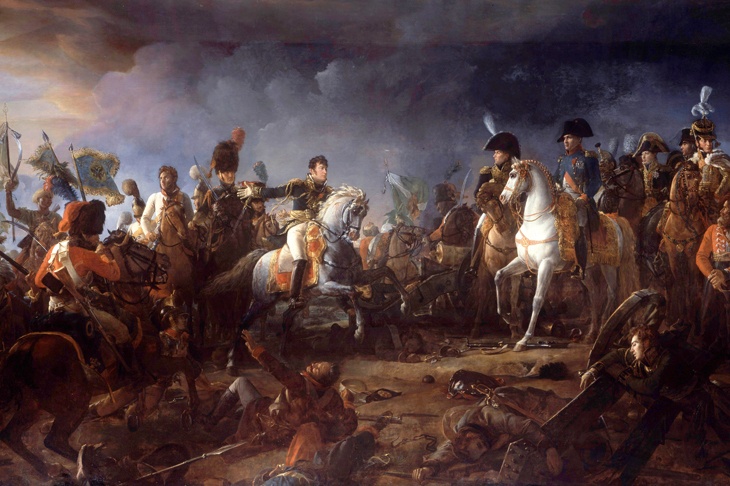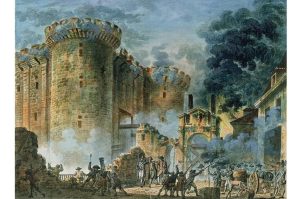On 20 July 1805, just three months before the battle of Trafalgar destroyed a combined French and Spanish fleet, the Emperor Napoleon ordered his chief-of-staff to ‘embark everything’ for the invasion of England that he had been dreaming of for two years. ‘My intention is to land at four different points,’ he explained to Berthier, ‘at a short distance from one another… Inform the four marshals there is not an instant to be lost.’
While there is possibly no saga in his whole astonishing career — Russia included — that so vividly exposes the curious and almost wilful blind spots in Bonaparte’s make-up, his enemies would have done well to pay closer attention. It is impossible to say if the invasion was ever more than fantasy; but those two years since the collapse of the Treaty of Amiens had not been wasted, and just a month after that letter to Berthier, the Army of the Ocean Coast, which for month after month had been trained and drilled and hardened and forged into the greatest army Europe had ever seen, turned its back on its channel camps and England to march on a world hopelessly ill-prepared to face it.
The ‘Army of England’ was no more, and the Grande Armée born. If the ‘good times’, as Michael Broers put it in the first volume of this biography, were behind Napoleon, ‘the years of greatness’ lay ahead. In his St Helena exile Napoleon would always look back on the Civil Code as his crowning achievement, but the Napoleon of legend, the Napoleon who still so violently divides opinion — Hegel’s ‘spirit of the age’ or a Corsican Hitler — will always be inseparably linked with the triumphs of Ulm, Austerlitz, Jena-Auerstedt and Wagram that form the core of this second volume.
However it might look with the benefit of hindsight, though, there cannot have seemed anything inevitable about these victories when Napoleon performed his grand pirouette and turned his army towards central Europe and Britain’s Austrian and Russian allies. The aura of invincibility that would soon cloak the Grande Armée was still to be earned in the autumn of 1805, and if Napoleon had the brilliant achievements of the First Italian Campaign and the hype of Marengo to feed off, no amount of propaganda, paintings, lies or self-promotion could disguise the fact that his record was a chequered one.
There were the horrors of Egypt and Syria — unheeded warnings of what could happen when armies that lived off the land strayed beyond their natural ‘habitat’ — and more to the point, as Broer insists, Napoleon had never actually commanded a force on anything like the scale now demanded. It would seem, too, that he was genuinely wary of a European war in 1805. But whatever anxieties he did have about the campaign could have lasted no longer than the dazzling enveloping triumph of Ulm, which ushered in a new epoch in European warfare.
There is precious little to be said about Napoleon’s military genius — or the wretched and divided leadership of his coalition enemies — that has not been said before; and what is most interesting about Broers’s account is the prophetic shadow it casts over even the most brilliant of Napoleon’s achievements. It probably makes little sense to try to distinguish between wars of security and wars of aggression with a man like Bonaparte; but whether it was manifest destiny or a grimmer necessity that drove him on, the fact was that every humiliation he inflicted on Europe’s royal houses, every crippling indemnity he slapped on a defeated nation, every tax and conscript he extorted from reluctant allies, every annexation and victorious march that took him closer to Alexander I’s Russia, was inviting its own inevitable backlash.
Napoleon was hardly the first to try to make his wars pay for themselves, to bleed an empire or subordinate his allies’ interests to his own. But with the issue in 1806 of his Berlin Decrees, aimed at strangling Britain through a continental blockade, he took this to another and dangerous level. It was certainly a measure of his strength in the aftermath of Austerlitz and Jena that he could legislate for Europe in this way; and yet in his determination to bend a whole continent to his will he had set in motion a chain of events that would ultimately doom his family, marshals, armies and resources to a bottomless Iberian sump and set the empire itself on its fatal collision course with Russia.
If this was ‘probably the single most momentous act of Napoleon’s career’, as Broers claims, its most pertinent interest for the years covered here lies in the light it throws on a mind ‘becoming habituated to absolute power’. I don’t suppose there are two historians who would agree a timetable for such an inscrutable process, but it is hard not to think that the curious aberrations and miscalculations of these triumphant years — the hegemonic ambitions, the over-extension of his power into southern Italy, the stubborn refusal to see Spain for what it was, the vindictive treatment of the Spanish Bourbons, the merciless hounding of the Catholic clergy, the stupidity of his dealings with Pius VII — are all, in their different ways, of a piece with the authoritarian, self-defeating hubris of his Berlin Decrees.
In 1810, though, when this volume ends, it would have taken a brave man to predict where all this would lead. Three years earlier, after their Tilsit summit, Alexander had prophesised that Napoleon would ‘break his own neck’; but that was still looking a long way off. A conservative, Catholic France might hate him and his wars for the ‘blood tax’ he extorted, but the conscripts in their hundreds of thousands would still come. Wagram had shown that Austria could learn from the drubbings of 1805, as Prussia would from Jena, but ‘the sun of Austerlitz’ was still high in the sky.
Britain lay beyond Napoleon’s reach — Copenhagen had rammed that home — and the Mediterranean was a playground for Royal Navy midshipmen, but north of the Pyrenees Europe at last enjoyed a peace of sorts. It was, as Broers says, a peace of conquest unlike that of Amiens, a peace won at the point of the sword, but however fragile, it was peace. And if, after his divorce from Josephine, Napoleon could not get the Russian bride he wanted, what could better encapsulate the events of these years than the marriage of a Hapsburg princess — the daughter of the humiliated Austrian Emperor, a niece of the guillotined Marie Antoinette — to that ‘force of nature’ and ‘master of history’ that the Revolution had spawned? The old was bowing to the new, the world of the ancien regime to that of dynamic change and merit, and there seemed nothing that could be done to stop it. ‘The diadem of Bonaparte,’ as an awed Edinburgh Review wrote,‘had dimmed the lustre of all the ancient crowns of Europe; and her nobles have been outshone, and out-generalled and out-negotiated, by men raised by their own exertion from the common level of the people.’
Murat, the son of a Gascon inn-keeper; Ney of a barrel-cooper; Soult the child of a village notary from near Albi; Bernadotte another Gascon raised from the ranks; the mighty Lannes an apprentice dyer from Lectoure — the Edinburgh Review was not wrong, and in Broers’s latest volume the magnitude and import of the Napoleonic achievements during these crucial years of French ascendancy gets the recognition it deserves.
So does Napoleon himself. What one wants of a biography on this scale is the scholarship without the show, and that is just what Broers delivers. Given, too, that this is a life already running to something over 1,000 pages, he writes with a mercifully broad brush, charting the crucial milestones in the vector — to borrow his own term — of Napoleon’s ‘journey’, without ever clogging his narrative with detail. There will, eventually, be an accounting — moral, historical — to be done, but that belongs to another volume.
His business here is to understand Napoleon and not to judge. And if that sometimes makes him more charitable than he need always be — more tolerant of the imperial bling, the ludicrous titles and uniforms, the grubby divorce, the littering of the thrones of Europe with his wretched family, than his subject deserves — empathy, as in his first volume, never gets the better of his critical detachment. This is a biography to trust.

















